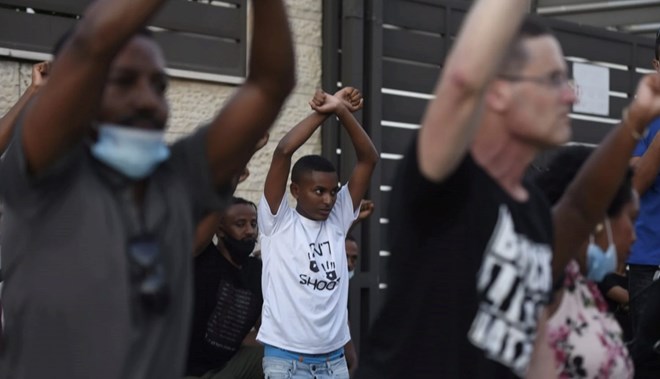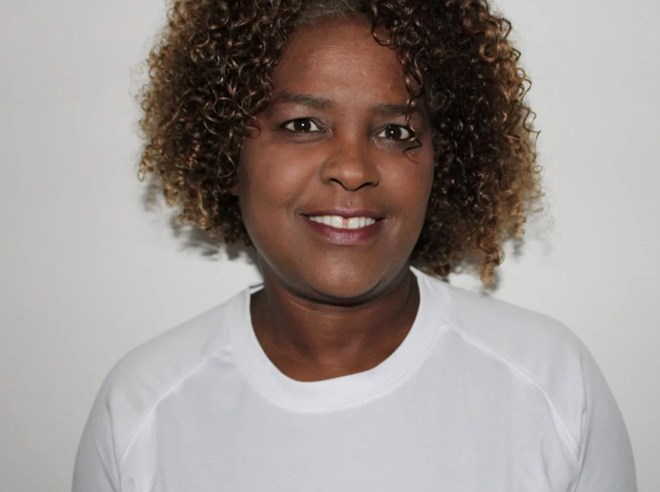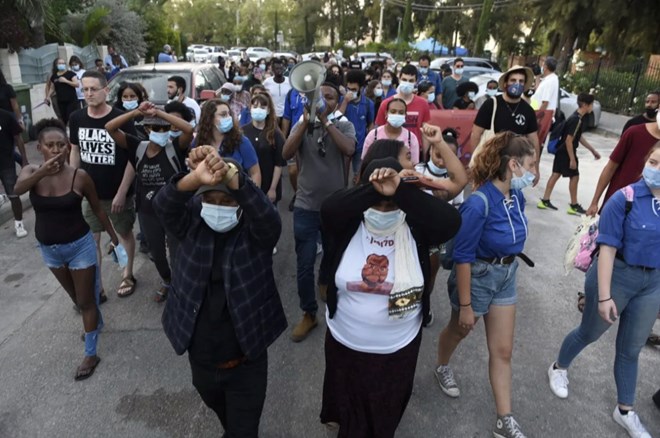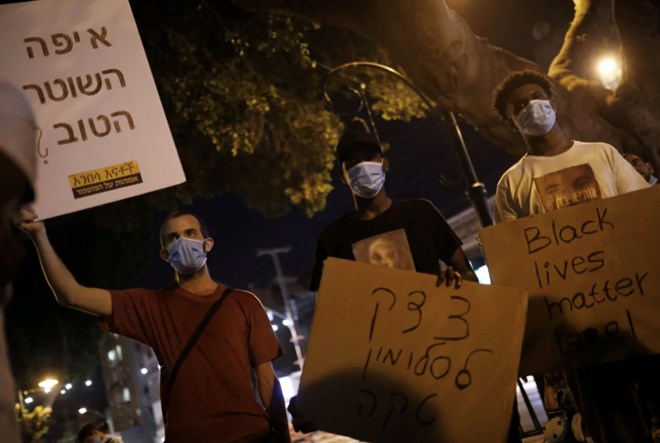
Tuesday August 4, 2020
Identifying with George Floyd is easy, says Shula Mola, a founder of the Association of Ethiopian Jews. White Israelis should confront the institutionalized racism at home, even at the anti-Netanyahu protests

Protest over the shooting of 18-year-old Israeli teen of Ethiopian Solomon Teka, who was shot to death by an off-duty police officer in June 2019.Credit: rami shllush
Shula Mola could be the poster child for the integration of Ethiopian Jews into Israeli society. The 47-year-old immigrated in 1984, part of the Operation Moses airlift, after making the treacherous trek across Sudan from her village in Ethiopia. She holds a doctorate in education from Ben-Gurion University and is a graduate of the prestigious Mandel School for Educational Leadership.
She’s also a teaching instructor and curriculum developer at the Center for Educational Technology and other educational institutions. Married and living in south Jerusalem, she’s the mother of four children, two of whom have already served in the military.
Mola is also one of the most outspoken activists of the Ethiopian community, fighting against what she considers the institutionalized and deep-rooted racism in all Israeli society. She has been an activist since high school and was a co-founder of the Association of Ethiopian Jews, together with Rabbi Micha Odenheimer. But she has been “almost consumed by rage,” she says, since last year's shooting deaths of Solomon Teka and Yehuda Biadga.
Teka was 18 when he was killed by an off-duty policeman in June 2019. The officer has been charged with reckless homicide and his trial is underway. Biadga, 24 at the time of his death, was shot by a policeman in January 2019.
In Mola’s eyes, Teka and Biadga were victims of police brutality and racism. In an interview with Haaretz at a café in south Jerusalem, the rage is palpable. In addition to her savvy, she’s also funny and sometimes even deliberately goofy, greeting the many people she knows in the neighborhood with a smile. But then comes the rage again, a product of current events and Israel’s ethnic and race relations.

Shula Mola.Credit: Noam Rachamim
Obviously, she says, she supports the current demonstrations against Prime Minister Benjamin Netanyahu. “I support the call for compassion and justice in our society, but I don’t think the problem is just Bibi – I think the entire establishment is full of rot,” she says.
Mola rarely attends these demonstrations; after all, she protests weekly with Mothers on Guard, an organization she helped found in 2016 after the death of Yosef Salamsa, who was Tasered by police and several months later was found dead, a suspected suicide.
“Each of us has to choose their activism, and I don’t see many whites coming to support the Teka family or protesting against police brutality against Ethiopians,” Mola says.
That’s one reason, she says, that Ethiopian Jews aren’t playing much of a role in the current protest movement. “They see it as a white protest, and our community is angry and bitter at the whites who, instead of supporting us, have blamed us and accused us of being hooligans at our demonstrations,” Mola says.
She also points to a more practical issue. “Most of the Ethiopian community is poor and struggling. Not many people have the energy or time to protest very much, unless it touches the community directly.”
Bad cops
Mola acknowledges that she feels vindicated by the police’s aggressive response to the anti-Netanyahu demonstrators.
“Now the ferenjim might understand that the police, supported by the media, frame anyone demanding justice as violent,” she says, using the Amharic word for “whites.” “So after the police had lots of practice on Arabs, asylum seekers, Haredim, and of course, Ethiopians, they’re turning that violence against whites.”
Yet, she adds, “even I was surprised that the police allowed the [right-wing] extremists to attack the demonstrators and didn’t do anything. The police let those thugs act as their mercenaries. I didn’t expect that the police would go so far against ferenjim in their attempt to protect the government and the status quo.”
Ferenjim, a term used in Ethiopia to describe someone from outside Africa whose skin is lighter than most Africans’, originally had no political meaning except to distinguish between “the density of the pigmentation in someone’s skin,” Mola says. “But here in Israel, we say ferenjim to refer to non-Ethiopians, and especially to those who are racist against brown people.”
Sometimes she describes Ethiopians as brown, other times as black. The distinction is deliberate. “In terms of color, we are brown, not black,” Mola says.
“Brown doesn’t carry any meaning – it’s just a factual difference between us. Black is a political term that refers to discrimination, racism, the unequal distribution of resources. With equals, I am brown. With racists, I am black.”
Yet she disdains the Israeli supporters of the Black Lives Matter movement. “For all the white liberal Jews here, identifying with what happened to George Floyd was easy. Condemning American racism doesn’t demand anything of them, they don’t have to confront their own racism right at home,” she says.
“When George Floyd was murdered in America, everyone was horrified. But when we Ethiopian Black people took to the streets to protest the police murdering our Black brothers, they called us hooligans, savages and primitives.
“The ferenjim tell us not to compare the situations in the United States and here. Of course our stories aren’t the same. The Beta Israel didn’t come to Israel the way the Africans were brought to America, and we haven’t been enslaved,” she says, referring to the Ethiopian Jewish community. “But just like in America, a white man here thinks that a Black life is worth less.
Mola then mentions the off-duty police officer who shot Teka.
“The cop testified that he actually thought it through and chose not to shoot in the air because he was afraid that he might hit bystanders,” Mola says.

Protest over the shooting of 18-year-old Israeli teen of Ethiopian Solomon Teka, who was shot to death by an off-duty police officer in June 2019.Credit: rami shllush
“I don’t think he initially intended to kill Teka. I think he just didn’t care. I think that when the police see an Ethiopian, they think to themselves, ‘they’re worth less, so I can push, insult, abuse, arrest or kill them.’”
Over-policing
Mola is contemptuous of the efforts the police say they’re making to change their treatment of Ethiopians. She mentions the Palmor Committee, which was established after demonstrations by Ethiopian Israelis in 2015 and was headed by Emi Palmor, then the director general of the Justice Ministry.
“I’ve given up on the illusion that the police, or the government, will ever do anything to fight racism. They haven’t done anything to change the situation. The report showed that the police open files against Ethiopians at a rate five times greater than their proportion in the country,” Mola says.
“There’s still over-policing in Ethiopian neighborhoods. Crime by white teenagers, like rowdiness or drugs, is normalized for whites and criminalized for Ethiopians, so they over-police our neighborhoods. I want all brown children to be free to walk wherever they want, and no policeman should hunt them down.”
Mola says this situation could only exist in a country that supports racism in all its institutions, and especially through the educational system.
“When we Ethiopians came here, the establishment treated our parents as the desert generation that would live here and die out. As if our story began when the whites came to Ethiopia to save us, as if we hadn’t lived in Ethiopian for more than 2,000 years with a wonderful culture and religion and wisdom,” she says.
“The whites wanted to raise us, the children, to be the hewers of wood and the carriers of water. The white establishment has spent lots of money on the Ethiopian community, but never to make us equals. They sent us to boarding schools that offered us no academic horizon, where we learned vocations that would never allow us to advance in the marketplace or fulfill our abilities, no matter how smart or talented any of us were.”
At best, Mola says, students suffered from the racism of low expectations. “Our teachers didn’t think we could accomplish anything or contribute anything. They praised us if we got a 60 on a test, instead of encouraging us to do better.”

Protest over the shooting of 18-year-old Israeli teen of Ethiopian Solomon Teka, who was shot to death by an off-duty police officer in June 2019.Credit: Tomer Appelbaum
When asked if the Ethiopian community supports her positions, she answers, “Why do you think of us as a single community? Because we’re brown? There are real differences among us. Some people think we have to thank the state for taking us in. Some think that if we just try hard enough, the ferenjim will treat us like equals. But more people are seeing that there’s a real problem of racism here.”
She says she has a message for the new Ethiopian immigrants
who arrived on July 23. “I welcome them, happy that they’re here after the Israeli authorities kept them for so long in the camps in Ethiopia,” she says.
“But I want them to know that the people who are supposedly responsible for their welfare here don’t care about them. There are good people here, but there’s a lot of racism. Some people will be vicious and evil towards you.
“As an immigrant and as a researcher, I know some ferenjim want to keep you down. They will lie to you. Don’t give up your agency – you lived full lives in your villages, you survived, you have strengths and abilities. Don’t let the authorities make you think that you’re worthless.”
Still, Mola concludes on a positive note. “When Teka was killed, I was in mourning. But then I told myself, I will not give up on my place in this society. For thousands of years our ancestors dreamed of coming here – even if they didn’t even know what the Land of Israel was,” she says.
“I have the privilege of being here now, and I have no right to give up on their dream. I will fight, and teach my children to fight, for our place as brown and Jewish in Israel.
“The current demonstrations don’t have a strategic plan. So I say, now is the time for us all to unite to effect change. We can transcend our bitterness and rage. And we, the Ethiopians, can lead the way to a broader, more inclusive view of our society.”